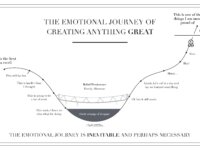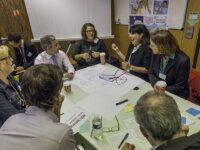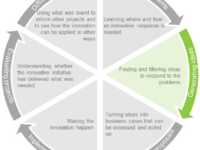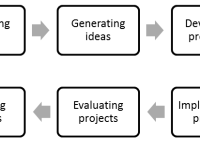Last week, I spoke about city innovation at SXSW (South by South West) festival as part of its inaugural Cities Summit program. SXSW is an annual design, technology, and innovation conference held in Texas. Typically viewed as a place for Silicon Valley startups to launch their latest disruptive product (like Twitter, which debuted there in 2007), SXSW is also getting a name for itself as a place where we have important conversations about public sector...
Posts on Methods
Have you ever felt bogged down or stuck when you were trying to introduce something new? When you just felt like it was easier to give up? At the start of an innovative project – whether it starts with a cool new idea, or with a problem that provides an opportunity to rethink how things are done – there can be a lot of energy and enthusiasm. The sense that things could be better, that...
This blog was authored by former OPSI intern, Théo Bourgery. In the context of the OECD’s “Evidence-Informed Policy-Making” conference, I had the opportunity to interview Kaisa Lähteenmäki-Smith and Camille Laporte on the role of experimentation in the drafting of evidence-based policies. As part of the ‘Evidence-Informed Policy-Making’ conference, co-organised by the OECD’s Directorate for Public Governance and the European Commission’s Joint Research Centre, Piret…
GPS system came out of the US Defence Department. Same as ARPANET, the basis of the modern Internet. NASA scientists put the man on the moon. Point here? Public sector innovation does not happen by itself but grows out of people and organisations (and their rules) which made inventions possible. This is the point of departure of a recent report Fostering innovation in the public sector we have produced which explores the role that central government functions...
Have you ever heard the warnings “we shouldn’t innovate for the sake of it” and “innovation isn’t an end in itself”? In this somewhat contrarian post I’d like to suggest a different perspective, one that argues that innovation for its own sake is both: a) quite uncommon, as innovation usually serves a number of purposes, even if they are not always explicit; and b) not something to worry about even when/if it does happen, and...
The case for innovation in the public sector is well known, but despite being on the agenda of governments for much of the past decade it often remains limited to small teams, scattered activities and/or high profile projects. Often these teams and projects involve external innovators and specialists being brought in to government to work on key projects. While governments will still need the expertise of external specialists – to ensure they maintain access to...
Today we’re releasing our ‘alpha’ version of the report about the second stage of the innovation lifecycle – generating ideas. We’re looking for feedback and constructive critique about what might have been missed, what should not be included, what is useful and what is less so. We’d also like this work to reflect your lived experience as much as it can, so we also look forward to receiving any examples or stories that can illustrate...
How do countries get insight into the big issues that are affecting them, such as the refugee crisis or youth unemployment? How do they come up with new ways of seeing problems that allow for new ways of responding? On the 17th and 18th of October the European Commission hosted the event “Lab Connections: Policy Labs in Europe, for Europe” to look at one mechanism that is increasingly used by governments to come up with...
How do you know why, when and how you should use a particular tool to get the best results? I’m working on the development of an Innovation Toolkit for public servants and I want to hear from you about how you choose between methods, and what information you need when you are using a new approach. Why an innovation toolkit? The work of public servants is changing. Traditional methods no longer guarantee the same results...
Back in November 2014, at the launch of the Observatory of Public Sector Innovation, more than 400 policy makers, front line public servants, civil society organisations, and academics gathered at the OECD to celebrate government innovation—how we can do things differently to achieve positive results for individuals and society. At that event, the OECD made a call to action for governments to create the conditions to promote and enable public sector innovation. How did countries...










